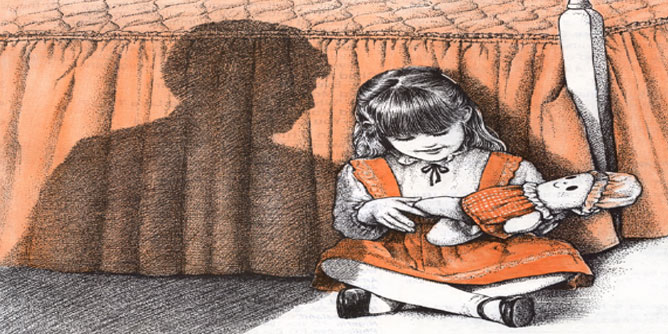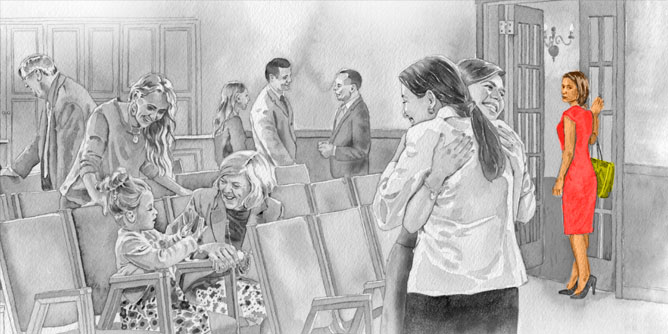In light of what was discussed in the UK’s Independent Inquiry Child Sexual Abuse (IICSA), we are bringing to you a series of articles on child abuse written by Duncan Corbett, an IICSA core participant and former Jehovah’s Witness elder of 18 years, to help Jehovah’s Witnesses protect their children from the debased actions of pedophiles in their midst. Duncan is happy for The Watchtower to take these series of articles and publish them, as it may help them out of a hole that they have dug for themselves. This is the second part of the series and is inspired by the open letter to Jehovah’s Witnesses on behalf of survivors of child sex abuse.
“I prayed to Jehovah my God and made confession … we have sinned and done wrong.” – Daniel 9:4, 5
1 Humans are by nature imperfect. As a natural consequence of this we all sin in word and deed. () Both the Hebrew and Greek words used in the Bible to refer to sin carry the thought of missing, in the sense of missing a mark or goal. Whether aiming an arrow at a target, throwing a basket ball towards the hoop, or shooting for goal in a game of soccer, we
would not expect any imperfect human to hit the bulls-eye, score a basket or a goal with every attempt.
1. What trait afflicts all humans?
2 We should not allow this human trait to weigh us down unduly. Our heavenly Father knows that we struggle with imperfection every day and, as long as our attempts are whole-hearted, we can be sure that he is well pleased with our efforts. Moreover, he sent his son to die for our sins so that we might enjoy a good relationship with God in spite of them. Whatever the results of our genuine attempt to reach Jehovah’s perfect standard, it is as though Jesus steps in on our behalf to make up the shortfall. He presents us before Jehovah as if we had achieved a perfect score. (Read Rom 5:6-11[/su_tooltip])
2. Why should we not be despondent?
3 Having accepted that we are bound to fall short on occasion, we must also accept that it will, at times, be necessary for us to apologize. As well as damaging our relationship with God, our errors can also damage our relationship with fellow humans because they may be hurt by our actions. To illustrate, an adult Christian who smokes a cigarette damages his relationship with God. One who persuades a teenager left in his care to smoke along with him would also damage his relationship with both the teenager and the parents whose trust he has betrayed.
3. What consequences follow from the fact that we are all sinful by nature?
4 Although we may rely on the ransom sacrifice to make up for our shortcomings with respect to our relationship with God this does not result in automatic reconciliation with fellow humans who have suffered as a result. In his letter to the Romans, Paul urges Christians to “pursue the things making for peace” (). A first step in pursuing peace is to offer a sincere apology to those who were hurt by our actions. Why do some find this first step so difficult?
4. What provision for reconciliation is provided by the ransom but what does it not cover?
OVERCOMING BARRIERS TO AN APOLOGY
5 It is easy for us to admit to being imperfect humans who make mistakes when we are speaking in general terms. Who of us would dream of claiming that we had never made a mistake that was worthy of an apology? It is more difficult, however, when it comes to admitting to a specific mistake that is worthy of an apology. Why? Pride stands in the way. Especially in the case where we consider the person who has been hurt as less important or significant than ourselves. The manager of a business would likely expect an employee to apologize for arriving late to a meeting because he is inconvenienced by it. Would the manager be as ready to offer an apology if, on a different occasion, he caused a meeting to run late, thereby inconveniencing his employees? Christians are urged to cultivate the quality of humility. (Read ). Such an attitude will make it easier to accept that we have made a mistake that caused hurt to others.

6 Perhaps we do not really feel that we were individually responsible for the mistake. In pursuing peace within the congregation we should not allow a battle over apportioning blame to take the place of a sincere apology. In this regard, note the fine example set by Abigail. When her wealthy husband, Nabal, had refused to provide for David and his men, David set off with a small army intent on a massacre. Abigail intercepted him, sending servants ahead with provisions for David’s men. What happened when she met David? (Read ). Abigail could easily have reasoned that since her husband had snubbed David then he should be the one to apologize. But she recognized that in this case, restoring peace was more important than apportioning blame. She also realized that, had she been aware earlier of the way her husband had treated David’s messengers, she could have prevented the situation from escalating. She willingly accepted the blame for this. Her sincere apology saved many lives that day.
5-6. What barriers to apologizing might we need to overcome?
A COMMUNAL APOLOGY
7 On some occasions it is appropriate for an individual to make an apology on behalf of a group, a communal apology. One such case is recorded in the book of Daniel. Having been in captivity for many years, Daniel discerned that the time for the nation of Israel to return to their homeland was imminent. How did Daniel approach Jehovah? (Read ) Had Daniel himself done anything for which he needed to apologize? Far from it! He had served Jehovah faithfully for many years. But he recognized that as part of a nation that had strayed from serving Jehovah an apology was needed. Notice that he began with a contrite confession of the wrongs of the nation.
7. How did Daniel approach Jehovah as the time for release of the Israelites from captivity approached?
8 As we mentioned earlier, admitting to a specific mistake or wrongdoing is often the first barrier to an apology. Someone who believes they have nothing for which to apologize is unlikely to make a sincere apology. Daniel set a fine example by setting out the wrongs the nation had committed and recognizing that their exile was deserved. In a similar way the congregations of Jehovah’s people today find themselves in a situation that is largely of their own making.
9 Over the course of the 1970’s and 80’s it became evident that the problem of child sexual abuse was increasingly prevalent and church leaders were among those being accused. As an organization, we did what we could to draw attention to the danger. Like Abigail, however, we failed to notice and take action as early as we might have. When the same issue began to raise its head in our own congregations it seemed that there were a few isolated cases. In time it became evident that the problem was more widespread, involving even elders and ministerial servants as perpetrators. In 1997 we took action and asked congregations to send us information regarding known abusers so that at least we could attempt to manage the situation.
8-9. What can be learned from the examples of (a) Daniel and (b) Abigail?
10 In retrospect, we made a serious misjudgment as an organisation. We were concerned primarily that we must avoid bringing reproach on Jehovah’s name. Having published details about the problem of child abuse on other organisations, in particular the Catholic church, we realized that similar accusations could now be leveled at us. We also wished to avoid causing panic within the congregations. We are ashamed to say that we were less than transparent about the scale of the problem. Had we recognized and acted upon it earlier then much heartache could have been avoided.

11 Ironically, the result of our failure has been to bring greater reproach on God’s name. This could have been avoided if we had acted sooner. The delay in acting has also meant that abusers already in the congregation were allowed to remain and perpetrate their crimes against victims that could have been spared by swift action. We now find ourselves in a situation where the organisation is reaping what it has sown. Those damaged by our previous policies have sometimes been stumbled to the point of leaving the organisation and suing for damages. We have found ourselves the subject of investigation by secular authorities such as the Royal Commission into Institutional Responses to Child Sexual Abuse in Australia and the Independent Inquiry into Child Sexual Abuse in Britain. A number of offices in European countries have been raided by police. The longer it went on the more difficult it became to be honest and open about the problem.
10-11. What mistakes have been made by Jehovah’s modern-day people and with what consequences?
12 Although current members of the Governing Body were not directly responsible for the decisions of thirty years ago, this does not mean that no apology is appropriate. Like Daniel we offer a full and frank confession and apology on behalf of the organisation. (see BOX: A Message from the Governing Body)
A MESSAGE FROM THE GOVERNING BODY
WE CONFESS before our God, Jehovah that, as an organisation trusted by him, we have betrayed that trust.
WE HAVE FAILED to act swiftly to report perpetrators of child sexual abuse to secular authorities and in so doing we have created an environment that allows perpetrators to continue their heinous crimes.
WE ARE SORRY that many children suffered unnecessarily as a result of our failure to act.
WE APOLOGIZE to them for the hurt caused to them as well as for the damage to their extended family and friends. We humbly acknowledge that such hurt continues far beyond childhood.
WE APOLOGIZE to all agents of law enforcement who have been frustrated in the past by our failure to report all crimes and to divulge evidence.
WE APOLOGIZE to secular authorities whose laws we ought to have respected, in their role as God’s minister.
WE BEG that Jehovah will forgive us for these failings as well as the reproach we have brought upon his name as a result.
WE ARE DETERMINED that we will demonstrate the sincerity of our apology by making every effort to right the wrongs of the past.
12 and BOX. What unprecedented measure is the Governing Body taking?
FORGIVENESS MUST BE GIVEN FREELY
13 What of the recipient of a sincere apology? Notice what God’s word has to say on the subject (Read ; ; ). The overwhelming message of the verses we have just read is that forgiveness must be given freely and must be heartfelt. It is not as though forgiveness is a right that can be demanded by the one making an apology. Imagine a husband who has been unfaithful to his wife. He apologizes and then suggests that, since he has apologized, everything is now well with their relationship and she ought to get started on preparing dinner. That would betray a lack of sincerity in the apology. Would we not expect that he adopt a contrite attitude, begging her forgiveness, while recognizing that it will take time to win back her trust?
14 In a similar way we recognize that the damage caused by child sexual abuse is long-lasting and spreads beyond the child. A survivor of childhood abuse will experience the effects for the rest of their life. Although they may learn to cope with the burden over time, it will not be until the new earth is fully established that full healing will take place. (). The parents of a child harmed by sexual abuse naturally share their pain. Their close friends in whom they confide share the pain. Their future marriage partner may suffer along with them, perhaps as they experience flashbacks during moments of intimacy. All those who have suffered or continue to suffer by reason of our inaction as an organisation in the past deserve our apology, but forgiveness is at the discretion of those who suffered. Those responsible for the hurt are in no position to make demands, as though forgiveness is automatic following an apology.
13-14. (a) Who is deserving of an apology? (b) Why can forgiveness not be demanded as a right?

15 For that reason we make a new provision that allows for those who have suffered to consider their response so that forgiveness comes from the heart. Any person damaged by child abuse within the congregation may choose to stop associating without sanction. Whether the person is a childhood victim of abuse, a parent of such a child, an adult survivor or the spouse of a survivor, or even a close friend and confidant, any may exercise the right to stop associating with the organisation that is, in some
measure, responsible for their suffering.
16 It would be entirely inappropriate to shun a person who chooses to leave for this reason. The practice of shunning is designed to cause an unrepentant sinner to realize the error of his ways. () A person damaged by the consequences of child abuse is not a sinner. They have no need to repent and they should not be coerced into forgiveness, otherwise the forgiveness would be meaningless. The wronged wife in our earlier illustration might choose to separate from her husband for a period of time or even to obtain a scriptural divorce. The congregation would not take action against her for such a decision. She is the innocent party. Similarly, a person affected directly or indirectly by child sexual abuse is the innocent party and may choose to separate from the congregation temporarily or permanently. The congregation will take no action against such a person.
15-16 What new provision is being made and why?
17 Like a truly repentant erring husband, we do not wish anyone to leave the congregation because they have been hurt by sexual abuse. Rather than shunning such a person we would take extraordinary measures to extend kindness towards them in an attempt to win back their trust. We would recognize, however, that applying undue pressure would be inappropriate. While we would love to win them back and regain their trust, their forgiveness must come freely and with a complete heart.
17. How should we treat any who choose to leave our ranks as a result of the direct or indirect effects of child sexual abuse?
ALL SERVICE MUST BE WILLING
18 In fact, the same willing spirit must characterize all of our sacred service in order for it to have value in the sight of God (Read ). How might a Christian today be offering sacred service grudgingly or under compulsion? Suppose that a member of the congregation attends meetings and has a token share in the ministry but his heart is not really in it; his service is rendered grudgingly. Suppose that the only real reason for his attendance is that he fears the loss of his friends and family if he should leave. Then his service could be described as being under compulsion, driven only by the fact that his support network is being held hostage.
19 Jehovah does not wish any to feel compelled to serve him and would not wish any to be doing so in a way that is anything but cheerful. For that reason we extend an opportunity for any who currently feel they are serving under compulsion to leave now. Such individuals may disassociate themselves without fear of being shunned by friends or family. When Gideon was preparing for battle against Midian, he gave a similar opportunity for those whose heart was not really in the battle to leave. The ten thousand who remained did not vilify or punish the twenty thousand who chose to return home. (). So today, let anyone whose heart is not complete “return home” without fear of future repercussions.
18-19. What other group may take advantage of this new provision and why is that appropriate?
20 Last week we discussed new arrangements for improving our procedures with respect to child safeguarding in our congregations. This week we have emphasized the importance of apologizing for our past failings. Genuine repentance, however, requires a zeal for “righting the wrong” (). In next week’s study we will outline measures designed to do that.
20. What will be the subject of our discussion next week?
HOW WOULD YOU ANSWER
- Why is it important to apologize for mistakes?
- What if the error is not ours personally?
- Who has authority to extend forgiveness or not and how should this affect our view of those who choose to leave the congregation?